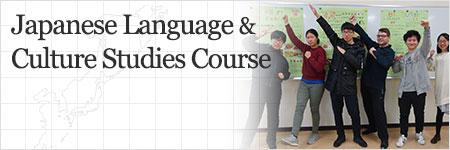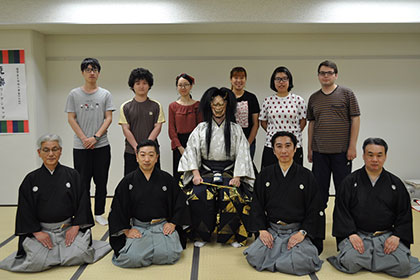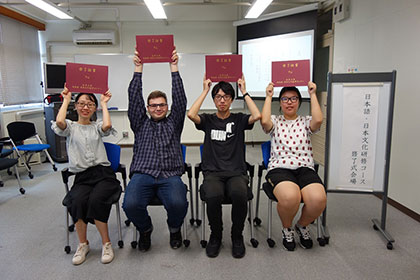 |
|||||
|
Course Details
Outline
Acceptable Student Number : 10 students
Period : October - August (11 months)
Subjects of the Course
*Required subjects, per week (each class 90 minuets).
A minimum of 40 credits must be earned.
Subject |
Autumn Semester |
Spring Semester |
Subtotal |
| Japanese ( Comprehensive ) | 5 ( 5credits ) |
- |
5 ( 5credits ) |
| General Subjects for Japanese Students | - |
3 ( 6credits ) |
3 ( 6credits ) |
| Japanese ( Reading ) | 1 ( 2credits ) |
1 ( 2credits ) |
2 ( 4credits ) |
| Japanese ( Writing ) | 1 ( 2credits ) |
1 ( 2credits ) |
2 ( 4credits ) |
| Japanese ( Oral ) | 1 ( 2credits ) |
1 ( 2credits ) |
2 ( 4credits ) |
| Japanese ( Listening ) | 1 ( 2credits ) |
- |
1 ( 2credits ) |
| Contemporary Japanese Society | 1 ( 2credits ) |
- |
1 ( 2credits ) |
| Japanese Circumstances C II | 1 ( 2credits ) |
- |
1 ( 2credits ) |
| Overview of Japanese Literature | 1 ( 2credits ) |
- |
1 ( 2credits ) |
| Local Field Study – Discover Gifu | 1 ( 2credits ) |
- |
1 ( 2credits ) |
| Japanese Culture and Arts | - |
1 ( 2credits ) |
1 ( 2credits ) |
| Thesis Supervision | - |
1 (1credits ) |
1 ( 1credits ) |
| Thesis | ( 4credits ) | ( 4credits ) | |
Total |
12 ( 19credits ) |
9 ( 21credits ) |
21 ( 40credits ) |
Titles of subjects are subject to change.
Japanese Language Subjects
The "Japanese (Comprehensive)" class aims to develop the student's overall proficiency in Japanese, including grammar, vocabulary, oral/aural comprehension abilities, and writing skills. Other independent classes focus on the four important skills of reading comprehension, academic skills in writing the thesis, oral presentation skills for discussion and seminar presentation, and listening skills to understand lectures given in Japanese.
Japanese Culture Subjects
The culture classes enable students to learn about various aspects of Japanese culture. Students are encouraged to compare Japanese culture with their own cultures in order to appreciate the differences and similarities between them. A acknowledgement and recognition of such differences and similarities can be further enhanced by discussion with Japanese students. Developing this awareness of the importance of cultural understanding will lead to selection of a thesis topic in the Spring Semester.
Supervision
Academic staff members below of the Center for Japanese Language and Culture offer individual supervision on academic matters and student welfare at Gifu University. If necessary depending on the students' research topic, other academic staff members of the Center and other faculties are available for additional support.
| Chief Supervisor | |||
Name |
Faculty/Center |
Position |
Expertise |
TSUCHIYA Momoko |
Center for Japanese Language and Culture |
Professor |
Japanese Literature |
MORITA Koichi |
Center for Japanese Language and Culture |
Professor |
History of Japanese Culture |
| Support Staff | |||
| Other academic staff members from the Center, and from the Faculty of Regional Studies, and Faculty of Education are included as support staff. |
|||
Field Trips


Several field trips within Gifu Prefecture (Gifu city, Gujo city, etc.) are included in the Course to deepen the students' understanding and appreciation of Japanese culture. Students contribute to Gujo city to promote Inbound tourism by activities such as monitoring tour plans, having discussions with staff members of the local government. They also take roles of international exchange in Gifu city and Gifu Prefecture. The University also offers a field trip for overseas students.
Requirements for Completing of the Course / Certificate of Completion
A certificate of completion will be issued upon satisfactory completion of the Course (all required and some elective classes).
Credits
Transfer credits can be arranged by negotiation with the students' home universities.
Japanese Studies Scholarship: Qualifications and Conditions
- Applicants must be regular students (2nd year or above) in an undergraduate program at their home university.
- Applicants must be majoring or double majoring in Japanese language and Japanese studies at their university.
- Applicants must have passed the N2 level Japanese Language Proficiency Test or equivalent proficiency in Japanese.
Accommodation
Gifu University International House was established to provide accommodation for international students. Accommodation at the International House will be provided to students of this course.